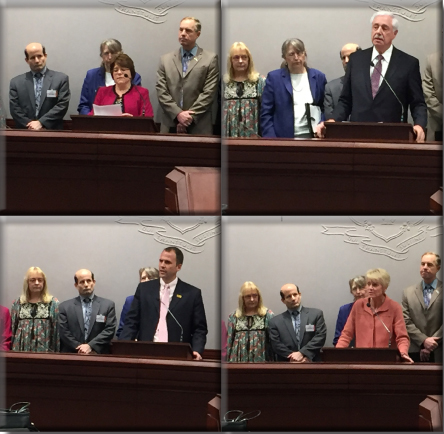CAS Members Oppose Bill Prohibiting Use of Test Scores in Teacher Evaluations

Leading educators express opposition to S.B. 380, An Act Concerning the Exclusion of Student Performance Results on the Mastery Examination from Teacher Evaluations. Clockwise from top left: Lisa Eells, Principal of Wintonberry Early Childhood Magnet School in Bloomfield; Dr. Joseph Cirasuolo, Executive Director of CAPSS; Nathan Quesnel, Superintendent of East Hartford Public Schools; and Dr. Karissa Niehoff, Executive Director of CAS
On Monday, March 7th, a coalition of leading education, parent, business, and community organizations held a press conference at the Legislative Office Building to express its strong opposition to SB 380, An Act Concerning the Exclusion of Student Performance Results on the Mastery Examination from Teacher Evaluations. The proposed bill seeks to prohibit the use of Smarter Balanced Assessment data in the evaluation process.
Representatives from the Connecticut Association of Schools, the Connecticut Parent Teacher Association, the Urban League of Southern Connecticut, Hartford Parent University, the Connecticut Association of Boards of Education, the Connecticut Business and Industry Association, the Connecticut Council for Education Reform, the Connecticut Coalition for Achievement Now and the Connecticut Association of Public School Superintendents presented testimony. Despite divergent agendas and constituencies, they were united in their insistence on the importance of assessment data as a tool for improvement and on the urgency of allowing the Performance Evaluation Advisory Council (PEAC) to continue to do the important worked with which is was charged by the legislature.
Representing CAS were Rosie O’Brien Vojtek, CAS President-Elect and principal of Ivy Drive School in Bristol; and Lisa Eells, CAS board member and principal of Wintonberry Early Childhood Magnet School in Bloomfield. In her remarks, Rosie stressed the need for assessment data in order to set high-level learning goals for students & high-level performance goals for teachers. “The only way educators will continue to improve the art and science of pedagogy will be through a positive and effect evaluation system that provides quality feedback; supports individual and collective professional development; aligns with state and local standards; and is driven by the results of student achievement,” stated Rosie.
Lisa Eells shared the successes that the Bloomfield schools have had thanks to its comprehensive use of state test data. The district’s reliance on metrics led to increased graduation rates, improved SAT scores, and ELA scores on the 2015 SBAC that were above the state average. Asserted Lisa, “Especially in districts where low socioeconomic status exists, the state test data brings a standard that allows for no excuses regarding student achievement outcomes and for high quality teachers to be maintained. Removing state test data from the teacher and administrator evaluation system will disband the common purpose and concentration that teachers and administrators have gained in collaborating to increase their own performance and accountability together for stronger student achievement results.” Read Lisa’s full remarks here.
CAPSS Executive Director Dr. Joe Cirasuolo emphasized that teacher evaluations tied to multiple measures, including student achievement growth, can dramatically improve the quality of teaching and learning in schools. He reported that 55% of teachers and 64% of administrators agree that, where appropriate, state test results should be used for teacher evaluation.
Following the morning press conference was a public hearing of the Education Committee in which sixteen bills were addressed. In addition to testifying against SB 380, Executive Director Dr. Karissa Niehoff provided testimony on HB 5552, An Act Concerning Special Education; SB 378, An Act Concerning the Recommendations of the High School Graduation Requirements Task Force; and, SB 381, An Act Establishing a Task Force to Study School Climate. Click here to view the written testimony submitted on behalf of CAS’ member schools.
——————————————————————————————————————————————————————————————————-
In further developments . . .
On Wednesday May 9th, the Performance Evaluation Advisory Council met and passed two very important recommendations essentially rendering S.B. 380 unnecessary . . .
- Recommendation #1– Plan Submission and Approval Process: PEAC recommends that local educational agencies (LEAs) be able to continue with their current CSDE-approved plan for the 2016-17 school year. LEAs would not be expected to submit their 2016-17 Educator Evaluation and Support Plan, unless they seek an alteration to that plan.
- Recommendation #2– Use of State Test Data in Educator Evaluation: PEAC recommends to extend flexibility and not require the use of state mastery test in the evaluation and support systems in 2016-17 school year. PEAC will continue to study this, and other issues, more deeply in order to formulate its long-term recommendations for Guideline revisions.
These two recommendations provide teachers, principals and superintendents with clear, timely guidance for what will be required during the 2016-17 school year while PEAC continues to develop long-term recommendations for guideline revisions. Both recommendations will be considered at the State Board of Education’s April 6th meeting.
